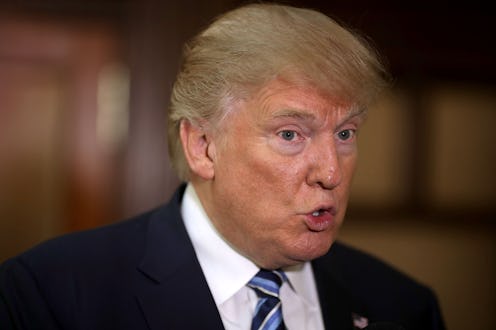News
Comparisons Between Trump And Brexit Fall Short
Things don’t look great for Donald Trump. With just under two weeks until Election Day, the populist insurgent candidate is flagging in the polls, especially in key, must-win swing states, making his path to 270 electoral votes seem narrower than ever. To combat any late-breaking crisis of confidence, Trump has been invoking the surprise result of June’s UK referendum on leaving the European Union — more commonly known as “Brexit” — as a sign that a similar upset will happen with the presidential race. The only problem? Brexit and Trump are not all that similar, and those key disparities are going to make a world of difference.
It might be useful first to outline the ways in which the Trump movement and the campaign to leave the EU are similar. They are both movements that originate on the far right of their respective country’s political spectrums. They enjoyed populist support, much of which stemmed from resentment among working-class whites who felt their livelihoods were being threatened by immigration and that elite politicians weren’t sensitive to their hardships. And both were largely underestimated by the media, which early on dismissed both movements as fringe factions with little chance of electoral success.
And while the similarities are striking, on a technical level, the two votes are quite different.
Perhaps the most important difference is that in this presidential election, voters are choosing a person, not an idea. The distinction between the question on the referendum and the person advocating for it would have been clear.
Compare this to Trump and the hit he’s taken over his comments about women, and the resulting accusations of sexual assault (which he has adamantly and consistently denied). There is no separating Trump the man from the GOP, despite the best efforts by some Republicans to do so.
The other crucial difference is that even if you were to concede that the polls might be incorrect à la Brexit — and some argue that the Brexit polls got it right, or at least showed a statistical tie — the kind of error that would be necessary to produce a win for Trump would be enormous.
Clinton has been steadily ahead of Trump in the polls for weeks now. Still, pollsters like Nate Silver aren’t counting out the possibility of some sort of systemic polling error swaying the results. FiveThirtyEight still gives Trump a roughly 15-percent chance of victory (The New York Times forecast gives Trump an 8-percent chance; the Huffington Post gives him less than 3 percent), but let’s be clear: 15 percent is not great odds.
Factor in other differences — the higher quality polling available in the United States, for instance — and a Brexit-style surprise seems less and less likely.
Plus, it’s important to account for the effect the Brexit surprise has had on American voters. For any left-leaning U.S. voter who paid attention to the shock and regret expressed by many in the United Kingdom in the wake of the Referendum (charmingly termed “Regrexit”), you can bet that they’ll be sure to make it to their polling place on election day to avoid the same fate.
